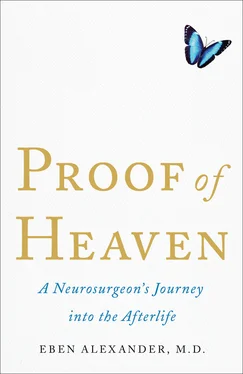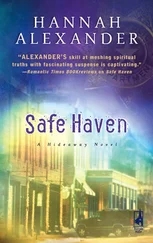The doctors loaded my body with three powerful intravenous antibiotics before sending me up to my new home: a large private room, number 10, in the Medical Intensive Care Unit, one floor above the ER.
I’d been in these ICUs many times as a surgeon. They are where the absolute sickest patients, people just inches from death, are placed, so that several medical personnel can work on them simultaneously. A team like that, fighting in complete coordination to keep a patient alive when all the odds are against them, is an awesome sight. I had felt both enormous pride and brutal disappointment in those rooms, depending on whether the patient we were struggling to save either made it or slipped from our fingers.
Dr. Brennan and the rest of the doctors stayed as upbeat with Holley as they could, given the circumstances. This didn’t allow for their being at all upbeat. The truth was that I was at significant risk of dying, very soon. Even if I didn’t die, the bacteria attacking my brain had probably already devoured enough of my cortex to compromise any higher-brain activity. The longer I stayed in coma, the more likely it became that I would spend the rest of my life in a chronic vegetative state.
Fortunately, not only the staff of Lynchburg General but other people, too, were already gathering to help. Michael Sullivan, our neighbor and the rector in our Episcopal church, arrived at the ER about an hour after Holley. Just as Holley had run out the door to follow the ambulance, her cell phone had buzzed. It was her longtime friend Sylvia White. Sylvia always had an uncanny way of reaching out precisely when important things were happening. Holley was convinced she was psychic. (I had opted for the safer and more sensible explanation that she was just a very good guesser.) Holley briefed Sylvia on what was happening, and between them they made calls to my immediate family: my younger sister, Betsy, who lived nearby, my sister Phyllis, at forty-eight the youngest of us, who was living in Boston, and Jean, the oldest.
That Monday morning Jean was driving south through Virginia from her home in Delaware. Fortuitously, she was on her way to help our mother, who lived in Winston-Salem. Jean’s cell phone rang. It was her husband, David.
“Have you gone through Richmond yet?” he asked.
“No,” Jean said. “I’m just north of it on I-95.”
“Get onto route 60 West, then route 24 down to Lynchburg. Holley just called. Eben’s in the emergency room there. He had a seizure this morning and isn’t responding.”
“Oh, my God! Do they have any idea why?”
“They’re not sure, but it might be meningitis.”
Jean made the turn just in time and followed the undulating two-lane blacktop of 60 West through low, scudding clouds, toward Route 24 and Lynchburg.
It was Phyllis who, at three o’clock that first afternoon of the emergency, called Eben IV at his apartment at the University of Delaware. Eben was outside on his porch doing some science homework (my own dad had been a neurosurgeon, and Eben was interested in that career now as well) when his phone rang. Phyllis gave him a quick rundown of the situation and told him not to worry—that the doctors had everything under control.
“Do they have any idea what it might be?” Eben asked.
“Well, they did mention gram-negative bacteria and meningitis.”
“I have two exams in the next few days, so I’m going to leave some quick messages with my teachers,” said Eben.
Eben later told me that, initially, he was hesitant to believe that I was in as grave danger as Phyllis had indicated, since she and Holley always “blew things out of proportion”— and I never got sick. But when Michael Sullivan called him on the phone an hour later, he realized that he needed to make the drive down— immediately .
As Eben drove toward Virginia, an icy pelting rain started up. Phyllis had left Boston at six o’clock, and as Eben headed toward the I-495 bridge over the Potomac River into Virginia, she was passing through the clouds overhead. She landed at Richmond, rented a car, and got onto Route 60 herself.
When he was just a few miles outside Lynchburg, Eben called Holley.
“How’s Bond?” he asked.
“Asleep,” Holley said.
“I’m going to go straight to the hospital then,” Eben said.
“You sure you don’t want to come home first?”
“No,” Eben said. “I just want to see Dad.”
Eben pulled up at the Medical Intensive Care Unit at 11:15 P.M. The walkway into the hospital was starting to ice over, and when he came into the bright lights of the reception area he saw only a night reception nurse. She led him to my ICU bed.
By that point, everyone who had been there earlier had finally gone home. The only sounds in the large, dimly lit room were the quiet beeps and hisses of the machines keeping my body going.
Eben froze in the doorway when he saw me. In his twenty years, he’d never seen me with more than a cold. Now, in spite of all the machines doing their best to make it seem otherwise, he was looking at what he knew was, essentially, a corpse. My physical body was there in front of him, but the dad he knew was gone.
Or perhaps a better word to use is: elsewhere.
Darkness, but a visible darkness—like being submerged in mud yet also being able to see through it. Or maybe dirty Jell-O describes it better. Transparent, but in a bleary, blurry, claustrophobic, suffocating kind of way.
Consciousness, but consciousness without memory or identity—like a dream where you know what’s going on around you, but have no real idea of who, or what, you are.
Sound, too: a deep, rhythmic pounding, distant yet strong, so that each pulse of it goes right through you. Like a heartbeat? A little, but darker, more mechanical—like the sound of metal against metal, as if a giant, subterranean blacksmith is pounding an anvil somewhere off in the distance: pounding it so hard that the sound vibrates through the earth, or the mud, or wherever it is that you are.
I didn’t have a body—not one that I was aware of anyway. I was simply… there , in this place of pulsing, pounding darkness. At the time, I might have called it “primordial.” But at the time it was going on, I didn’t know this word. In fact, I didn’t know any words at all. The words used here registered much later, when, back in the world, I was writing down my recollections. Language, emotion, logic: these were all gone, as if I had regressed back to some state of being from the very beginnings of life, as far back, perhaps, as the primitive bacteria that, unbeknownst to me, had taken over my brain and shut it down.
How long did I reside in this world? I have no idea. When you go to a place where there’s no sense of time as we experience it in the ordinary world, accurately describing the way it feels is next to impossible. When it was happening, when I was there, I felt like I (whatever “I” was) had always been there and would always continue to be.
Nor, initially at least, did I mind this. Why would I, after all, since this state of being was the only one I’d ever known? Having no memory of anything better, I was not particularly bothered by where I was. I do recall conceptualizing that I might or might not survive, but my indifference as to whether I did or not only gave me a greater feeling of invulnerability. I was clueless as to the rules that governed this world I was in, but I was in no hurry to learn them. After all, why bother?
I can’t say exactly when it happened, but at a certain point I became aware of some objects around me. They were a little like roots, and a little like blood vessels in a vast, muddy womb. Glowing a dark, dirty red, they reached down from some place far above to some other place equally far below. In retrospect, looking at them was like being a mole or earthworm, buried deep in the ground yet somehow able to see the tangled matrixes of roots and trees surrounding it.
Читать дальше












